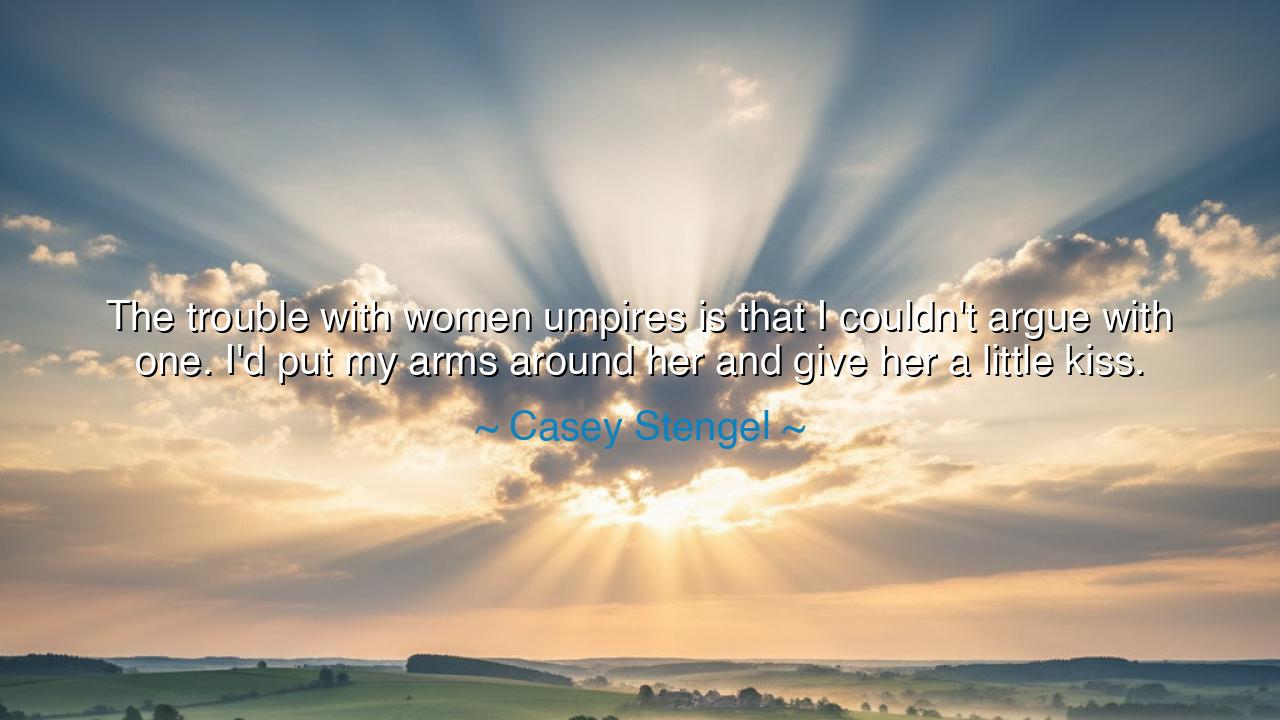
The trouble with women umpires is that I couldn't argue with
The trouble with women umpires is that I couldn't argue with one. I'd put my arms around her and give her a little kiss.






The words of Casey Stengel — “The trouble with women umpires is that I couldn’t argue with one. I’d put my arms around her and give her a little kiss.” — stand as a relic of another age, both humorous and telling. On the surface, they reveal the wit of a man who lived in the theater of baseball, where disputes with umpires were as much ritual as sport. Yet beneath the jest lies the echo of a deeper truth: that the arrival of women in roles once dominated by men unsettled old customs, forcing society to confront its own assumptions about gender, authority, and respect.
Stengel’s remark reflects the era in which he lived, when the notion of women umpires was seen as odd, even comical. To him, the idea of contesting fiercely with a woman was unimaginable; instead, his instinct leaned toward affection, not confrontation. Yet in this playful refusal lies the evidence of a deeper resistance — the difficulty men of his time had in recognizing women as equals in authority, capable of commanding the same respect and challenge as men. His humor was the mask of a culture wrestling with change.
History offers a parallel in the struggles of women entering professions where men had long reigned unchallenged. When Amelia Earhart first soared into the skies, many dismissed her as a novelty, unfit for the dangers of aviation. Yet her triumph in crossing the Atlantic proved that what had seemed laughable was in truth the herald of progress. So too with women in sport, governance, and science: what was once seen as unthinkable often became the ground of transformation.
The origin of Stengel’s words is thus not malice, but the dissonance of a shifting world. Humor, in his case, became a way of grappling with change — though it revealed the blindness of a generation still learning to grant authority beyond old boundaries. Yet in recording such sayings, history does not condemn alone; it reminds us how far the journey has been, and how the struggles of the past paved the way for greater equality today.
Therefore, O seekers of wisdom, see in this jest not merely laughter, but a lesson. When new voices rise to take their place in fields once closed to them, expect both resistance and ridicule. Yet know that the truth cannot be long denied: authority belongs not to gender, but to skill, wisdom, and courage. And as the world has learned since Stengel’s day, the time comes when even the jesters of old would bow before the rightful presence of women in every arena.






NNVH
While Casey Stengel's comment about women umpires might have been intended as a joke, it highlights a bigger issue in the treatment of women in sports. The notion that a man could just kiss a female umpire to resolve a disagreement is dismissive and demeaning. This kind of attitude perpetuates the idea that women in authoritative positions are there to be treated differently or less seriously than their male counterparts. How can we ensure women in sports are respected equally?
TThao
Reading Casey Stengel’s comment about women umpires, I feel a mix of disbelief and frustration. The statement, while likely meant to be lighthearted, reveals a lack of understanding about the boundaries of professionalism. The idea that a physical gesture could be seen as a solution to a disagreement undermines the seriousness of a woman’s role as an umpire. Why is there still a tendency to minimize the authority of women in these spaces?
LOTro ly Online
Casey Stengel’s comment about women umpires is a stark reminder of the casual sexism that was (and still can be) prevalent in sports. While some might brush it off as an outdated joke, it perpetuates a broader cultural issue of undermining women’s authority in male-dominated fields. How do we address the casual nature of sexism in these contexts and ensure that women are given the same respect as men, not just in sports but across all professional spheres?
ANTu Anh Nguyen
Casey Stengel’s quote seems to reveal a lack of respect for women in positions of authority. His statement about 'putting his arms around her and giving her a little kiss' is troubling and illustrates how gender roles have historically shaped perceptions of women in sports. How do we shift away from this mindset and create environments where women in positions of power are treated with the same level of professionalism and respect as their male counterparts?
MTvo minh thien
I’m really uncomfortable with Casey Stengel’s quote about women umpires. While I understand it was likely meant humorously, it’s troubling that this kind of behavior was seen as acceptable, especially in professional settings. The idea that a man would feel entitled to physically engage with a woman in that way diminishes her authority and professional standing. How did society allow such casual sexism to go unchecked, and how can we work toward a more respectful environment for women in sports?